NUR104 Assessment: Understanding Ageing and Health Challenges
VerifiedAdded on 2023/06/18
|7
|2086
|346
Homework Assignment
AI Summary
This assignment examines various aspects of ageing in Australia, including global and local trends, differences in ageing experiences between rural and urban populations, and disparities between indigenous and non-indigenous Australians. It explores the concept of successful ageing, highlighting the role of psychosocial theories like activity theory. The assignment further discusses the incidence and implications of volunteering among older adults and identifies organizations supporting their rights and equity. Additionally, it addresses age-related factors contributing to falls in older adults and strategies for prevention, assessment, and management. Finally, it delves into the challenges faced by informal caregivers and measures to support them. This resource is ideal for students seeking to understand the multifaceted dimensions of ageing and healthcare in the Australian context. Desklib provides solved assignments for students.
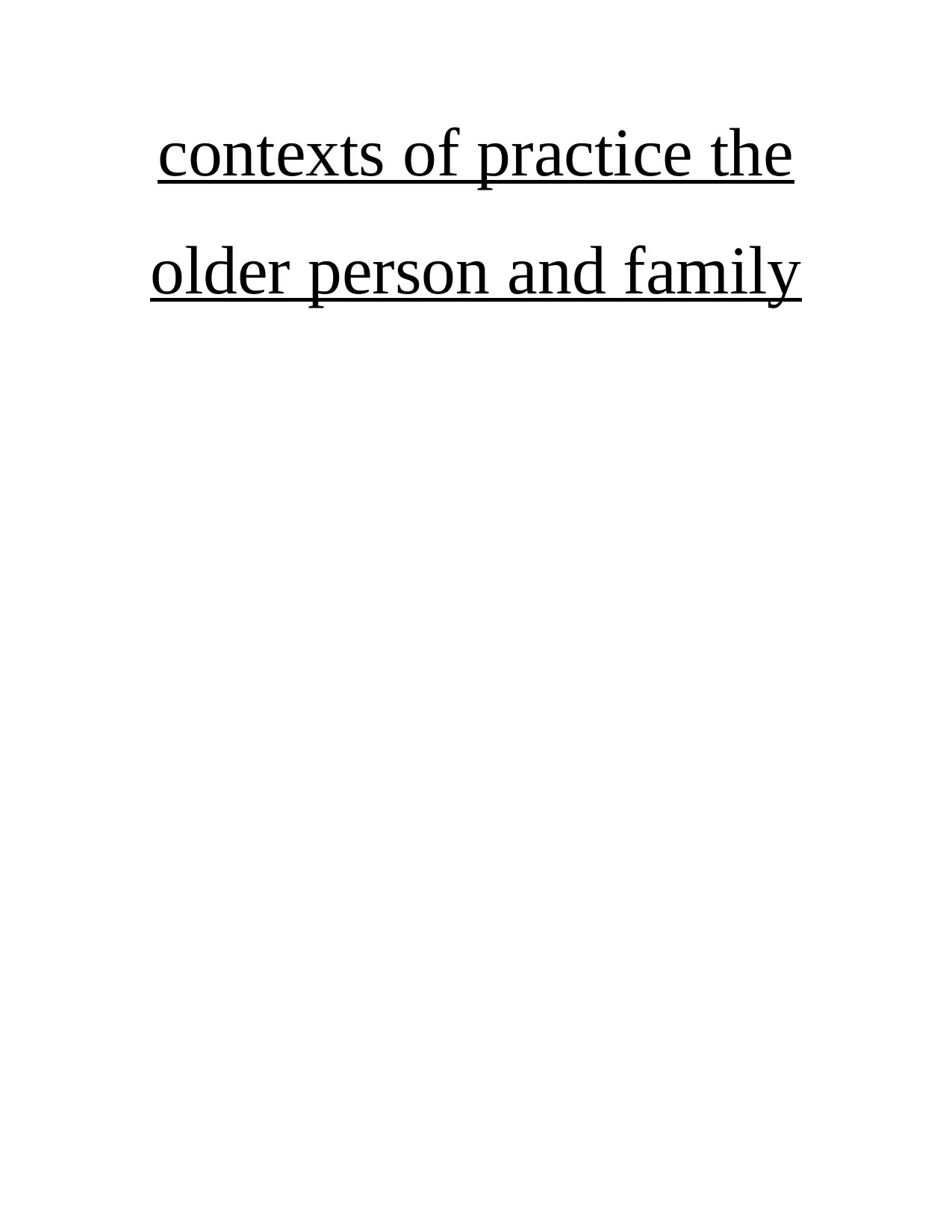
contexts of practice the
older person and family
older person and family
Paraphrase This Document
Need a fresh take? Get an instant paraphrase of this document with our AI Paraphraser
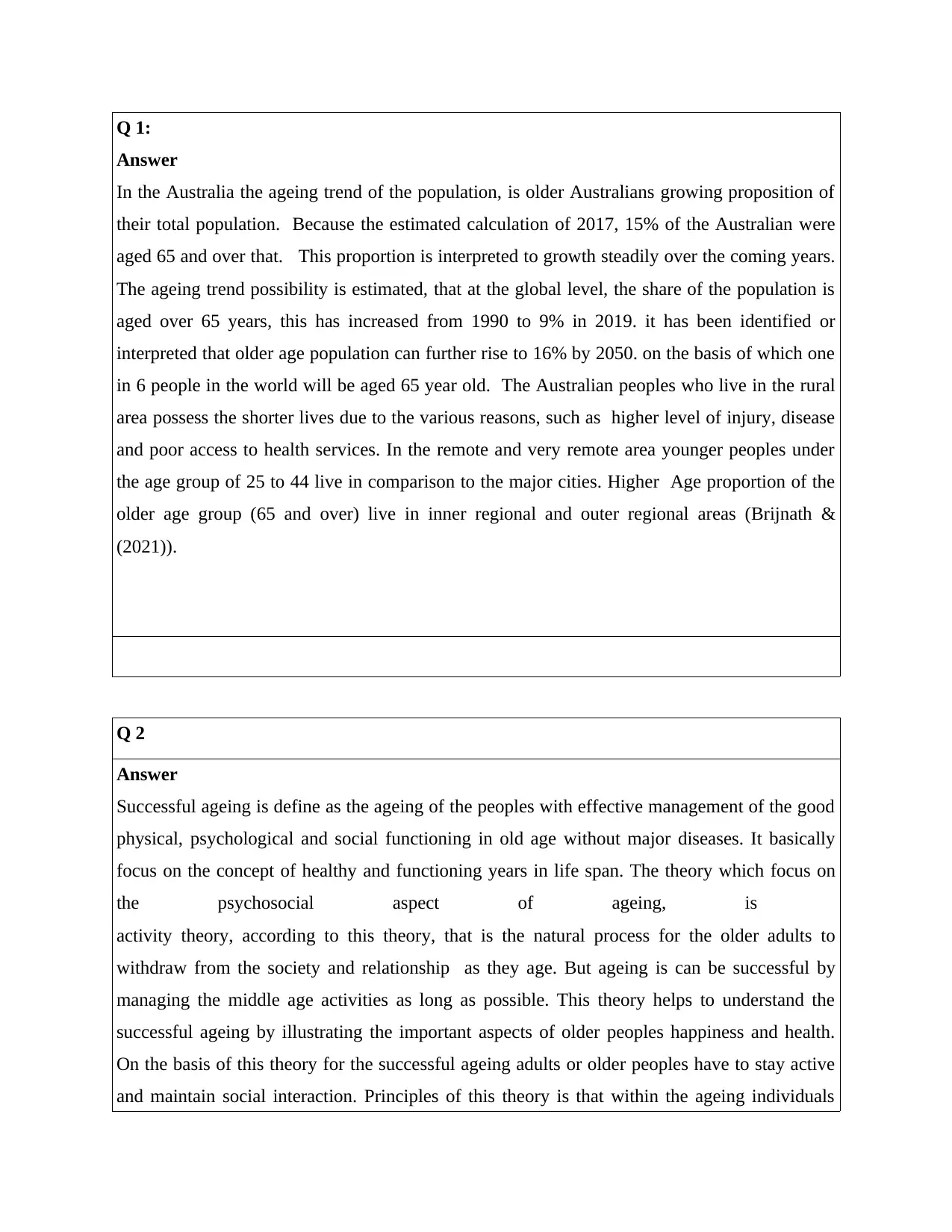
Q 1:
Answer
In the Australia the ageing trend of the population, is older Australians growing proposition of
their total population. Because the estimated calculation of 2017, 15% of the Australian were
aged 65 and over that. This proportion is interpreted to growth steadily over the coming years.
The ageing trend possibility is estimated, that at the global level, the share of the population is
aged over 65 years, this has increased from 1990 to 9% in 2019. it has been identified or
interpreted that older age population can further rise to 16% by 2050. on the basis of which one
in 6 people in the world will be aged 65 year old. The Australian peoples who live in the rural
area possess the shorter lives due to the various reasons, such as higher level of injury, disease
and poor access to health services. In the remote and very remote area younger peoples under
the age group of 25 to 44 live in comparison to the major cities. Higher Age proportion of the
older age group (65 and over) live in inner regional and outer regional areas (Brijnath &
(2021)).
Q 2
Answer
Successful ageing is define as the ageing of the peoples with effective management of the good
physical, psychological and social functioning in old age without major diseases. It basically
focus on the concept of healthy and functioning years in life span. The theory which focus on
the psychosocial aspect of ageing, is
activity theory, according to this theory, that is the natural process for the older adults to
withdraw from the society and relationship as they age. But ageing is can be successful by
managing the middle age activities as long as possible. This theory helps to understand the
successful ageing by illustrating the important aspects of older peoples happiness and health.
On the basis of this theory for the successful ageing adults or older peoples have to stay active
and maintain social interaction. Principles of this theory is that within the ageing individuals
Answer
In the Australia the ageing trend of the population, is older Australians growing proposition of
their total population. Because the estimated calculation of 2017, 15% of the Australian were
aged 65 and over that. This proportion is interpreted to growth steadily over the coming years.
The ageing trend possibility is estimated, that at the global level, the share of the population is
aged over 65 years, this has increased from 1990 to 9% in 2019. it has been identified or
interpreted that older age population can further rise to 16% by 2050. on the basis of which one
in 6 people in the world will be aged 65 year old. The Australian peoples who live in the rural
area possess the shorter lives due to the various reasons, such as higher level of injury, disease
and poor access to health services. In the remote and very remote area younger peoples under
the age group of 25 to 44 live in comparison to the major cities. Higher Age proportion of the
older age group (65 and over) live in inner regional and outer regional areas (Brijnath &
(2021)).
Q 2
Answer
Successful ageing is define as the ageing of the peoples with effective management of the good
physical, psychological and social functioning in old age without major diseases. It basically
focus on the concept of healthy and functioning years in life span. The theory which focus on
the psychosocial aspect of ageing, is
activity theory, according to this theory, that is the natural process for the older adults to
withdraw from the society and relationship as they age. But ageing is can be successful by
managing the middle age activities as long as possible. This theory helps to understand the
successful ageing by illustrating the important aspects of older peoples happiness and health.
On the basis of this theory for the successful ageing adults or older peoples have to stay active
and maintain social interaction. Principles of this theory is that within the ageing individuals
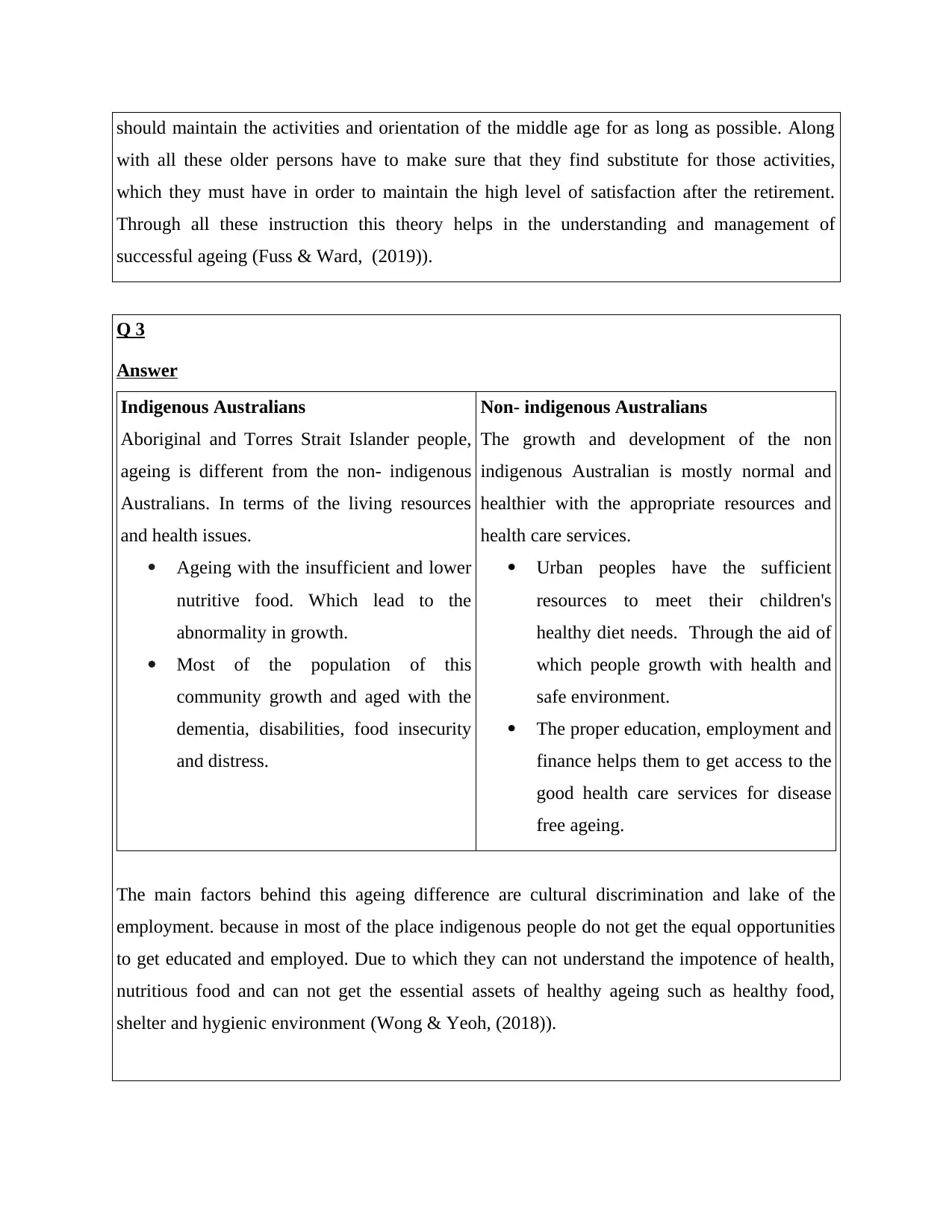
should maintain the activities and orientation of the middle age for as long as possible. Along
with all these older persons have to make sure that they find substitute for those activities,
which they must have in order to maintain the high level of satisfaction after the retirement.
Through all these instruction this theory helps in the understanding and management of
successful ageing (Fuss & Ward, (2019)).
Q 3
Answer
Indigenous Australians
Aboriginal and Torres Strait Islander people,
ageing is different from the non- indigenous
Australians. In terms of the living resources
and health issues.
Ageing with the insufficient and lower
nutritive food. Which lead to the
abnormality in growth.
Most of the population of this
community growth and aged with the
dementia, disabilities, food insecurity
and distress.
Non- indigenous Australians
The growth and development of the non
indigenous Australian is mostly normal and
healthier with the appropriate resources and
health care services.
Urban peoples have the sufficient
resources to meet their children's
healthy diet needs. Through the aid of
which people growth with health and
safe environment.
The proper education, employment and
finance helps them to get access to the
good health care services for disease
free ageing.
The main factors behind this ageing difference are cultural discrimination and lake of the
employment. because in most of the place indigenous people do not get the equal opportunities
to get educated and employed. Due to which they can not understand the impotence of health,
nutritious food and can not get the essential assets of healthy ageing such as healthy food,
shelter and hygienic environment (Wong & Yeoh, (2018)).
with all these older persons have to make sure that they find substitute for those activities,
which they must have in order to maintain the high level of satisfaction after the retirement.
Through all these instruction this theory helps in the understanding and management of
successful ageing (Fuss & Ward, (2019)).
Q 3
Answer
Indigenous Australians
Aboriginal and Torres Strait Islander people,
ageing is different from the non- indigenous
Australians. In terms of the living resources
and health issues.
Ageing with the insufficient and lower
nutritive food. Which lead to the
abnormality in growth.
Most of the population of this
community growth and aged with the
dementia, disabilities, food insecurity
and distress.
Non- indigenous Australians
The growth and development of the non
indigenous Australian is mostly normal and
healthier with the appropriate resources and
health care services.
Urban peoples have the sufficient
resources to meet their children's
healthy diet needs. Through the aid of
which people growth with health and
safe environment.
The proper education, employment and
finance helps them to get access to the
good health care services for disease
free ageing.
The main factors behind this ageing difference are cultural discrimination and lake of the
employment. because in most of the place indigenous people do not get the equal opportunities
to get educated and employed. Due to which they can not understand the impotence of health,
nutritious food and can not get the essential assets of healthy ageing such as healthy food,
shelter and hygienic environment (Wong & Yeoh, (2018)).
⊘ This is a preview!⊘
Do you want full access?
Subscribe today to unlock all pages.

Trusted by 1+ million students worldwide
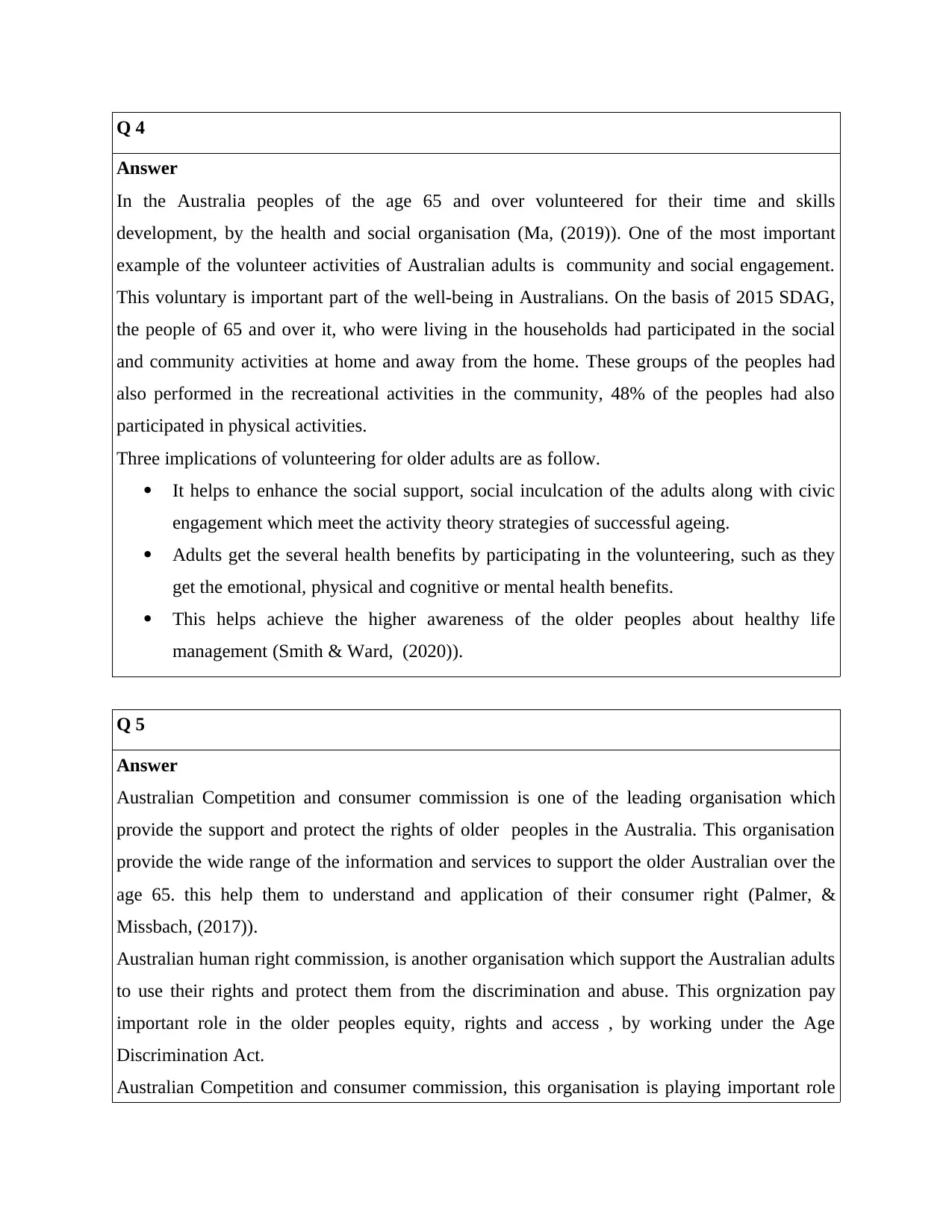
Q 4
Answer
In the Australia peoples of the age 65 and over volunteered for their time and skills
development, by the health and social organisation (Ma, (2019)). One of the most important
example of the volunteer activities of Australian adults is community and social engagement.
This voluntary is important part of the well-being in Australians. On the basis of 2015 SDAG,
the people of 65 and over it, who were living in the households had participated in the social
and community activities at home and away from the home. These groups of the peoples had
also performed in the recreational activities in the community, 48% of the peoples had also
participated in physical activities.
Three implications of volunteering for older adults are as follow.
It helps to enhance the social support, social inculcation of the adults along with civic
engagement which meet the activity theory strategies of successful ageing.
Adults get the several health benefits by participating in the volunteering, such as they
get the emotional, physical and cognitive or mental health benefits.
This helps achieve the higher awareness of the older peoples about healthy life
management (Smith & Ward, (2020)).
Q 5
Answer
Australian Competition and consumer commission is one of the leading organisation which
provide the support and protect the rights of older peoples in the Australia. This organisation
provide the wide range of the information and services to support the older Australian over the
age 65. this help them to understand and application of their consumer right (Palmer, &
Missbach, (2017)).
Australian human right commission, is another organisation which support the Australian adults
to use their rights and protect them from the discrimination and abuse. This orgnization pay
important role in the older peoples equity, rights and access , by working under the Age
Discrimination Act.
Australian Competition and consumer commission, this organisation is playing important role
Answer
In the Australia peoples of the age 65 and over volunteered for their time and skills
development, by the health and social organisation (Ma, (2019)). One of the most important
example of the volunteer activities of Australian adults is community and social engagement.
This voluntary is important part of the well-being in Australians. On the basis of 2015 SDAG,
the people of 65 and over it, who were living in the households had participated in the social
and community activities at home and away from the home. These groups of the peoples had
also performed in the recreational activities in the community, 48% of the peoples had also
participated in physical activities.
Three implications of volunteering for older adults are as follow.
It helps to enhance the social support, social inculcation of the adults along with civic
engagement which meet the activity theory strategies of successful ageing.
Adults get the several health benefits by participating in the volunteering, such as they
get the emotional, physical and cognitive or mental health benefits.
This helps achieve the higher awareness of the older peoples about healthy life
management (Smith & Ward, (2020)).
Q 5
Answer
Australian Competition and consumer commission is one of the leading organisation which
provide the support and protect the rights of older peoples in the Australia. This organisation
provide the wide range of the information and services to support the older Australian over the
age 65. this help them to understand and application of their consumer right (Palmer, &
Missbach, (2017)).
Australian human right commission, is another organisation which support the Australian adults
to use their rights and protect them from the discrimination and abuse. This orgnization pay
important role in the older peoples equity, rights and access , by working under the Age
Discrimination Act.
Australian Competition and consumer commission, this organisation is playing important role
Paraphrase This Document
Need a fresh take? Get an instant paraphrase of this document with our AI Paraphraser
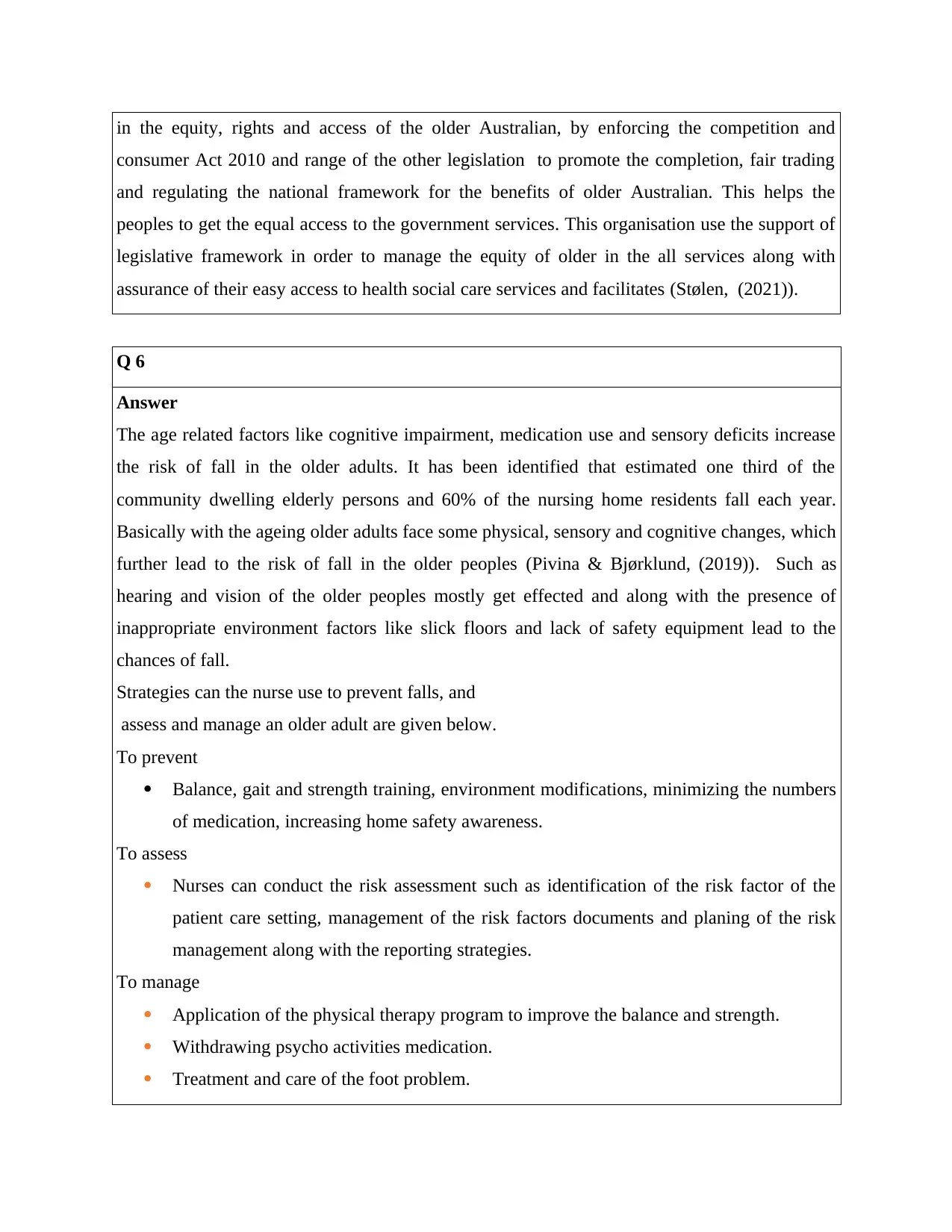
in the equity, rights and access of the older Australian, by enforcing the competition and
consumer Act 2010 and range of the other legislation to promote the completion, fair trading
and regulating the national framework for the benefits of older Australian. This helps the
peoples to get the equal access to the government services. This organisation use the support of
legislative framework in order to manage the equity of older in the all services along with
assurance of their easy access to health social care services and facilitates (Stølen, (2021)).
Q 6
Answer
The age related factors like cognitive impairment, medication use and sensory deficits increase
the risk of fall in the older adults. It has been identified that estimated one third of the
community dwelling elderly persons and 60% of the nursing home residents fall each year.
Basically with the ageing older adults face some physical, sensory and cognitive changes, which
further lead to the risk of fall in the older peoples (Pivina & Bjørklund, (2019)). Such as
hearing and vision of the older peoples mostly get effected and along with the presence of
inappropriate environment factors like slick floors and lack of safety equipment lead to the
chances of fall.
Strategies can the nurse use to prevent falls, and
assess and manage an older adult are given below.
To prevent
Balance, gait and strength training, environment modifications, minimizing the numbers
of medication, increasing home safety awareness.
To assess
Nurses can conduct the risk assessment such as identification of the risk factor of the
patient care setting, management of the risk factors documents and planing of the risk
management along with the reporting strategies.
To manage
Application of the physical therapy program to improve the balance and strength.
Withdrawing psycho activities medication.
Treatment and care of the foot problem.
consumer Act 2010 and range of the other legislation to promote the completion, fair trading
and regulating the national framework for the benefits of older Australian. This helps the
peoples to get the equal access to the government services. This organisation use the support of
legislative framework in order to manage the equity of older in the all services along with
assurance of their easy access to health social care services and facilitates (Stølen, (2021)).
Q 6
Answer
The age related factors like cognitive impairment, medication use and sensory deficits increase
the risk of fall in the older adults. It has been identified that estimated one third of the
community dwelling elderly persons and 60% of the nursing home residents fall each year.
Basically with the ageing older adults face some physical, sensory and cognitive changes, which
further lead to the risk of fall in the older peoples (Pivina & Bjørklund, (2019)). Such as
hearing and vision of the older peoples mostly get effected and along with the presence of
inappropriate environment factors like slick floors and lack of safety equipment lead to the
chances of fall.
Strategies can the nurse use to prevent falls, and
assess and manage an older adult are given below.
To prevent
Balance, gait and strength training, environment modifications, minimizing the numbers
of medication, increasing home safety awareness.
To assess
Nurses can conduct the risk assessment such as identification of the risk factor of the
patient care setting, management of the risk factors documents and planing of the risk
management along with the reporting strategies.
To manage
Application of the physical therapy program to improve the balance and strength.
Withdrawing psycho activities medication.
Treatment and care of the foot problem.
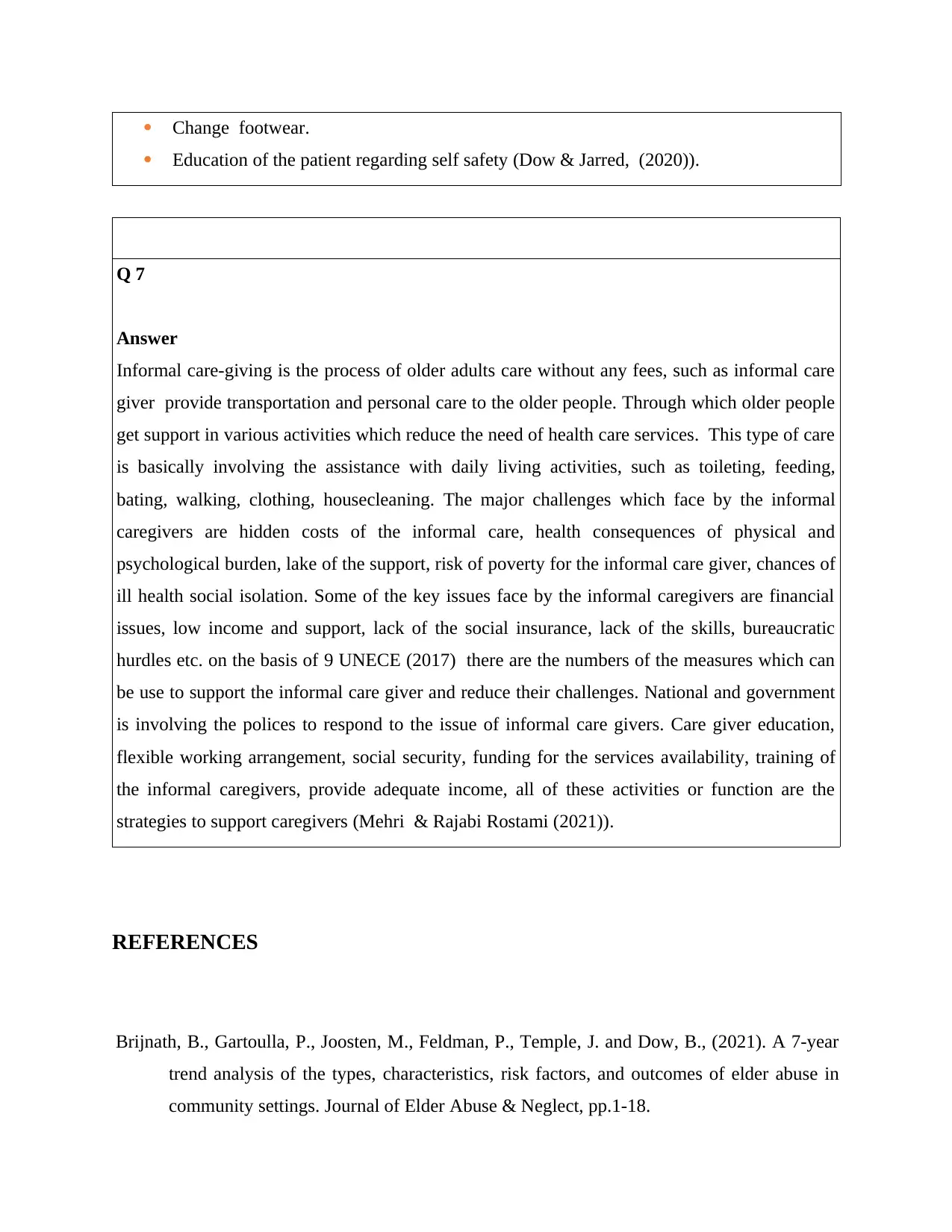
Change footwear.
Education of the patient regarding self safety (Dow & Jarred, (2020)).
Q 7
Answer
Informal care-giving is the process of older adults care without any fees, such as informal care
giver provide transportation and personal care to the older people. Through which older people
get support in various activities which reduce the need of health care services. This type of care
is basically involving the assistance with daily living activities, such as toileting, feeding,
bating, walking, clothing, housecleaning. The major challenges which face by the informal
caregivers are hidden costs of the informal care, health consequences of physical and
psychological burden, lake of the support, risk of poverty for the informal care giver, chances of
ill health social isolation. Some of the key issues face by the informal caregivers are financial
issues, low income and support, lack of the social insurance, lack of the skills, bureaucratic
hurdles etc. on the basis of 9 UNECE (2017) there are the numbers of the measures which can
be use to support the informal care giver and reduce their challenges. National and government
is involving the polices to respond to the issue of informal care givers. Care giver education,
flexible working arrangement, social security, funding for the services availability, training of
the informal caregivers, provide adequate income, all of these activities or function are the
strategies to support caregivers (Mehri & Rajabi Rostami (2021)).
REFERENCES
Brijnath, B., Gartoulla, P., Joosten, M., Feldman, P., Temple, J. and Dow, B., (2021). A 7-year
trend analysis of the types, characteristics, risk factors, and outcomes of elder abuse in
community settings. Journal of Elder Abuse & Neglect, pp.1-18.
Education of the patient regarding self safety (Dow & Jarred, (2020)).
Q 7
Answer
Informal care-giving is the process of older adults care without any fees, such as informal care
giver provide transportation and personal care to the older people. Through which older people
get support in various activities which reduce the need of health care services. This type of care
is basically involving the assistance with daily living activities, such as toileting, feeding,
bating, walking, clothing, housecleaning. The major challenges which face by the informal
caregivers are hidden costs of the informal care, health consequences of physical and
psychological burden, lake of the support, risk of poverty for the informal care giver, chances of
ill health social isolation. Some of the key issues face by the informal caregivers are financial
issues, low income and support, lack of the social insurance, lack of the skills, bureaucratic
hurdles etc. on the basis of 9 UNECE (2017) there are the numbers of the measures which can
be use to support the informal care giver and reduce their challenges. National and government
is involving the polices to respond to the issue of informal care givers. Care giver education,
flexible working arrangement, social security, funding for the services availability, training of
the informal caregivers, provide adequate income, all of these activities or function are the
strategies to support caregivers (Mehri & Rajabi Rostami (2021)).
REFERENCES
Brijnath, B., Gartoulla, P., Joosten, M., Feldman, P., Temple, J. and Dow, B., (2021). A 7-year
trend analysis of the types, characteristics, risk factors, and outcomes of elder abuse in
community settings. Journal of Elder Abuse & Neglect, pp.1-18.
⊘ This is a preview!⊘
Do you want full access?
Subscribe today to unlock all pages.

Trusted by 1+ million students worldwide
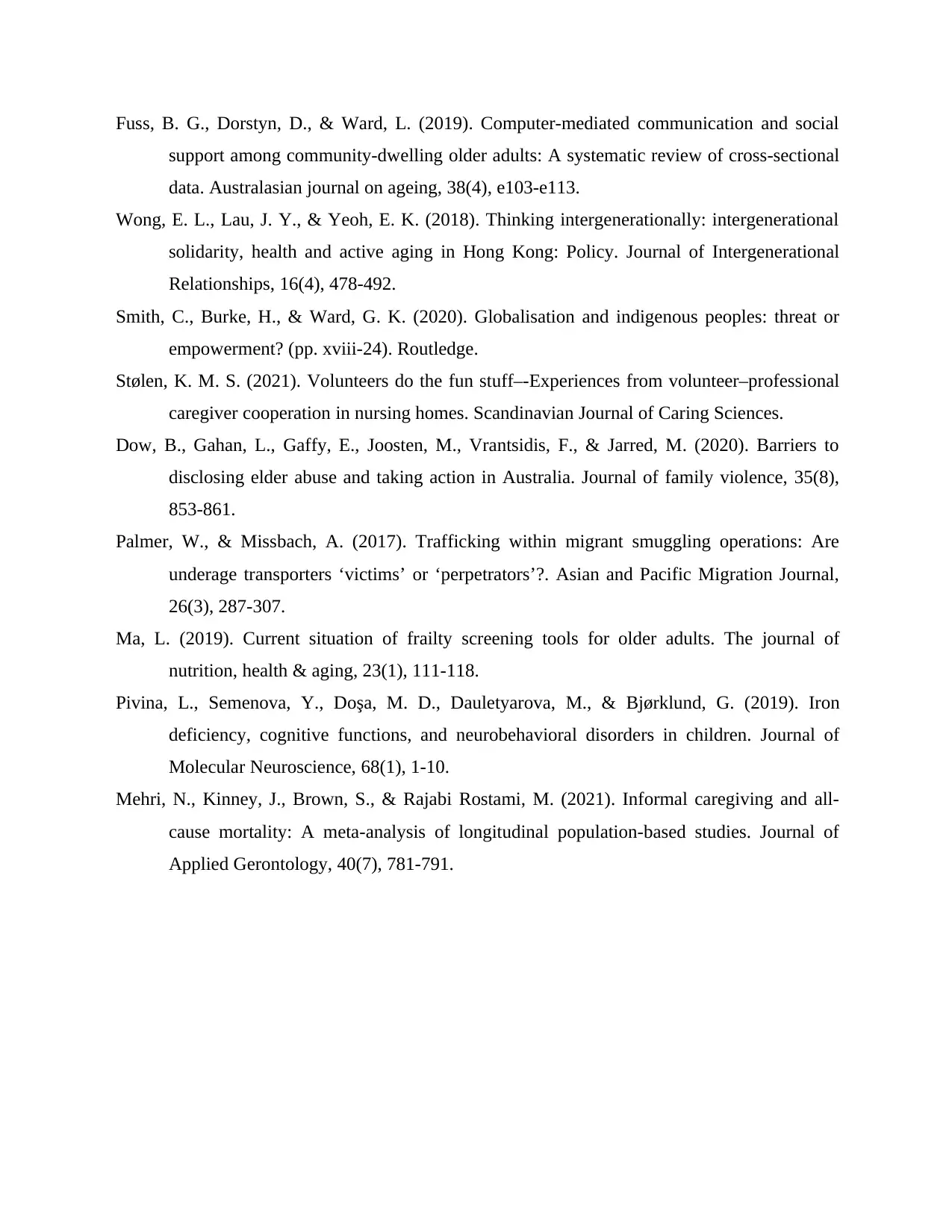
Fuss, B. G., Dorstyn, D., & Ward, L. (2019). Computer‐mediated communication and social
support among community‐dwelling older adults: A systematic review of cross‐sectional
data. Australasian journal on ageing, 38(4), e103-e113.
Wong, E. L., Lau, J. Y., & Yeoh, E. K. (2018). Thinking intergenerationally: intergenerational
solidarity, health and active aging in Hong Kong: Policy. Journal of Intergenerational
Relationships, 16(4), 478-492.
Smith, C., Burke, H., & Ward, G. K. (2020). Globalisation and indigenous peoples: threat or
empowerment? (pp. xviii-24). Routledge.
Stølen, K. M. S. (2021). Volunteers do the fun stuff–‐Experiences from volunteer‒professional
caregiver cooperation in nursing homes. Scandinavian Journal of Caring Sciences.
Dow, B., Gahan, L., Gaffy, E., Joosten, M., Vrantsidis, F., & Jarred, M. (2020). Barriers to
disclosing elder abuse and taking action in Australia. Journal of family violence, 35(8),
853-861.
Palmer, W., & Missbach, A. (2017). Trafficking within migrant smuggling operations: Are
underage transporters ‘victims’ or ‘perpetrators’?. Asian and Pacific Migration Journal,
26(3), 287-307.
Ma, L. (2019). Current situation of frailty screening tools for older adults. The journal of
nutrition, health & aging, 23(1), 111-118.
Pivina, L., Semenova, Y., Doşa, M. D., Dauletyarova, M., & Bjørklund, G. (2019). Iron
deficiency, cognitive functions, and neurobehavioral disorders in children. Journal of
Molecular Neuroscience, 68(1), 1-10.
Mehri, N., Kinney, J., Brown, S., & Rajabi Rostami, M. (2021). Informal caregiving and all-
cause mortality: A meta-analysis of longitudinal population-based studies. Journal of
Applied Gerontology, 40(7), 781-791.
support among community‐dwelling older adults: A systematic review of cross‐sectional
data. Australasian journal on ageing, 38(4), e103-e113.
Wong, E. L., Lau, J. Y., & Yeoh, E. K. (2018). Thinking intergenerationally: intergenerational
solidarity, health and active aging in Hong Kong: Policy. Journal of Intergenerational
Relationships, 16(4), 478-492.
Smith, C., Burke, H., & Ward, G. K. (2020). Globalisation and indigenous peoples: threat or
empowerment? (pp. xviii-24). Routledge.
Stølen, K. M. S. (2021). Volunteers do the fun stuff–‐Experiences from volunteer‒professional
caregiver cooperation in nursing homes. Scandinavian Journal of Caring Sciences.
Dow, B., Gahan, L., Gaffy, E., Joosten, M., Vrantsidis, F., & Jarred, M. (2020). Barriers to
disclosing elder abuse and taking action in Australia. Journal of family violence, 35(8),
853-861.
Palmer, W., & Missbach, A. (2017). Trafficking within migrant smuggling operations: Are
underage transporters ‘victims’ or ‘perpetrators’?. Asian and Pacific Migration Journal,
26(3), 287-307.
Ma, L. (2019). Current situation of frailty screening tools for older adults. The journal of
nutrition, health & aging, 23(1), 111-118.
Pivina, L., Semenova, Y., Doşa, M. D., Dauletyarova, M., & Bjørklund, G. (2019). Iron
deficiency, cognitive functions, and neurobehavioral disorders in children. Journal of
Molecular Neuroscience, 68(1), 1-10.
Mehri, N., Kinney, J., Brown, S., & Rajabi Rostami, M. (2021). Informal caregiving and all-
cause mortality: A meta-analysis of longitudinal population-based studies. Journal of
Applied Gerontology, 40(7), 781-791.
1 out of 7
Related Documents
Your All-in-One AI-Powered Toolkit for Academic Success.
+13062052269
info@desklib.com
Available 24*7 on WhatsApp / Email
![[object Object]](/_next/static/media/star-bottom.7253800d.svg)
Unlock your academic potential
Copyright © 2020–2026 A2Z Services. All Rights Reserved. Developed and managed by ZUCOL.





